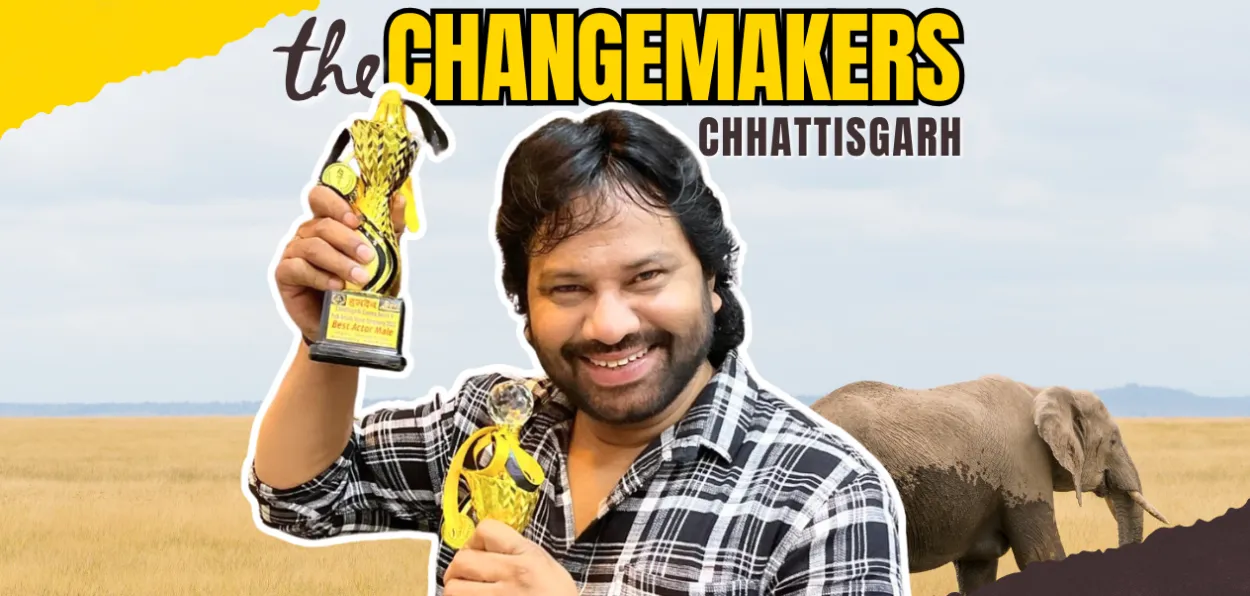
Mandakini Mishra/Raipur
Karan Khan is one of the biggest names in Chhattisgarhi cinema—popularly known as Chhollywood. For audiences across the state, he is more than just an actor; he is a superstar whose work has shaped the identity of regional cinema.
Over the years, his journey has gone far beyond films. Karan has appeared in hundreds of Chhattisgarhi songs and music albums, many of which went viral on YouTube and other platforms.
From albums like Dicto Karan Khan Mona Sen to countless folk-inspired numbers, his presence has expanded the reach of Chhattisgarhi culture to audiences far beyond the state.
.jpeg) Tahir Ali alias Karan Khan with fans
Tahir Ali alias Karan Khan with fans
ing Tahir Ali, much known as Karan Khan in Chhattisgarh, made a conscious choice to bridge cinema and music, building a fan base that cuts across generations. “When I see the Chhattisgarhi film industry thriving, I feel a deep sense of satisfaction. Our hard work is bearing fruit,” he says.
His latest film is being shot with the Arri Alexa, a high-end professional camera rarely seen in low-budget regional productions. For Khan, this is not just about technology but about pushing the boundaries of how Chhattisgarhi cinema is perceived. He has consistently spoken about the need to improve production quality while keeping traditions alive to match the aspirations of modern audiences.
.jpeg) Karan Khan with his award
Karan Khan with his award
Through his work, Khan has projected the language, traditions, and daily life of Chhattisgarh onto the screen. His active social media presence and constant interaction with fans have also given him a reach that extends far beyond local boundaries.
Behind the stardom lies a story of struggle. His father, Syed Zafar Ali, passed away when Karan was still a child. His mother, Shamsad Begum, raised five sons amid financial hardship, with his elder brothers stepping in to ensure he never felt deprived. Karan studied at Madhav Rao Sapre School in Budhapara, Raipur.
.jpeg) Karan Khan with fans
Karan Khan with fans
During his school days, he came into contact with the Indian People’s Theatre Association (IPTA), which introduced him to stagecraft. Under the mentorship of Minhaz Asad, he polished his acting skills, performing in numerous IPTA plays and later in telefilms for Doordarshan Raipur.
Although he worked in television serials after moving to Mumbai, the pull of Chhattisgarh’s soil brought him back just as the state’s film movement was gathering momentum. His first film, Mor Ganvai Gaon, flopped at the box office. But soon after, directors Prem Chandrakar and Bhupendra Sahu cast him in Tor Maya Ke Mare. The film became a massive hit, and his performance won widespread appreciation.
From there, there was no looking back. The name “Karan,” taken from his breakout film, stuck with audiences and eventually replaced his birth name. To date, he has acted in around 45 feature films and over 3,000 songs—a record in itself. His most successful films include Tor Maya Ke Mare, Mitan 420, Teeja Ke Lugra, Laila Teep Tap Chaila Angutha Chhap, Radhe Anguthachhap, Mohi Dare, Benaam Badshah, and Sasural.
.jpeg) Karan Khan with his family
Karan Khan with his familyOne of his most memorable roles was playing Dau Mandaraji in the biopic Mandaraji. Another milestone came with Benaam Badshah, a film highlighting the harms of alcoholism. Viewers wrote to him saying they had quit drinking after watching it, bringing joy back to their families. “I always try to send a message to society through my films,” he explains.
Karan has won the Best Actor Award more than 15 times, yet no government recognition has come his way. He is unfazed. “I have never sought such honours. True recognition must come unasked and without political strings. Only then is it real. I’m still waiting for that moment.”
For him, the biggest reward remains the love of his audience. “I’ve played all my characters with complete sincerity and received immense respect both inside and outside Chhattisgarh,” he says. “For this, I’m deeply grateful to Allah. My mother’s prayers, my wife Jahanara’s support, and the love of my daughters Anabiya Ali and Aroush Ali are my strength.”
ALSO READ: Scientist Shams Pervez keeps a hawk's eye on Raipur's air quality
To the youth, his message is simple: there are no shortcuts to fulfilling your dreams—hard work is the only mantra for success.
